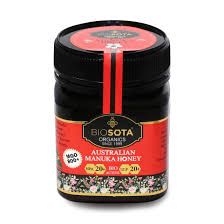Honey, in both its cultural and medicinal forms, has been revered for centuries. In some cultures, it has been dated back more than 8000 years! It’s depicted in Stone Age paintings and ancient Greek hieroglyphs, and – would you believe it – an actual piece of honeycomb was found preserved in an ancient Egyptian tomb!
It is the oldest sweetener in existence and has been recorded in many ancient scriptures from across the globe!
With the increased use of antibiotics and antibacterial products more and more bugs are becoming resistant to current treatments (2). Attempts to make bugs resistant to Manuka honey have failed, even when using diluted honey (2).
What is Manuka?
Manuka is a common name of the Leptospermum plant family. It is native to south-east Australia and New Zealand. Researchers have identified which family members produce medicinal honey, with some of Australia’s members being the best in the world.
Manuka honey is special due to its medicinal and antibacterial properties. One of the reasons for such qualities is the presence of methylglyoxal (this is where the MGO abbreviation comes from) in its content. It’s a chemical compound that causes an antiseptic effect. The higher the MGO number, the stronger the antibacterial and beneficial effects of the honey.
What are the benefits of Manuka?
Manuka honey is unique as it has properties that are not present in ordinary honey. Containing antioxidant, anti-inflammatory and antibacterial properties, the most notable factor of Manuka honey is its NPA or Non-Peroxide Activity. This is a measurement of the antiseptic property of the honey and the higher the NPA rating, the more potent the honey.
Manuka honey boasts a range of beneficial components including proteins, antioxidants, amino acids, magnesium, calcium, iodine, phosphorus and several vitamins. Researchers have found that the honey is effective against a wide range of pathogens (4) and Manuka honey’s medicinal properties work by reducing acute inflammation by enhancing immune response (3).
It is widely regarded that honey is a natural and safe form of antibiotic, with no reported bacterial resistance (2). The composition of Manuka honey consists of carbohydrates, minerals, proteins, fatty acids, phenolic and flavonoid compounds. But the main medicinal benefit of Manuka honey is its antibacterial properties which provide numerous wellbeing advantages including gut health, immunity, oral care and healthier skin.
What is the best product?
McDowells has chosen to stock Biosota products. Biosota honey is organic, raw and not heat-treated and cold extracted to ensure both an exceptional and one-of-a-kind taste. They also harvest our honey from some of the most pristine and remote locations in Australia, making it extremely rare.
References
(1) Bittmann, S. First results of Treating Pediatric Wounds with Medihoney: Analysis of 60 Cases. GSL Journal of Pediatrics 2018, 1, 102.
(2) Blair, S. E.; Cokcetin, N. N.; Harry, E. J.; Carter, D. A. The Unusual Antibacterial Activity of Medical-grade Leptospermum Honey: Antibacterial Spectrum, Resistance and Transcriptome Analysis. European Journal of Clinical Microbiology & Infectious Diseases 2009, 28, 1199–1208.
(3) Efficacy of Natural Honey Treatment in Patients With Novel Coronavirus
(4) Antibacterial activity of Manuka honey and its components: An overview Matthew Johnston, Published online 2018 Nov 27


